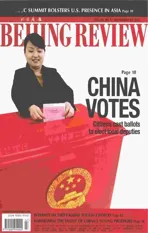WEEKLY WATCH
2011-10-14
WEEKLY WATCH
OPINION
Mental Health
A government-subsidized counseling center for teenagers has recently been established in Quanzhou, southeast China’s Fujian Province. In the center, volunteer psychologists offer totally free services to teenagers and young adults. More similar agencies are needed in China because counseling services are expensive and not easily available.
Since China’s society is undergoing rapid changes, teenagers, who generally have stronger personalities compared with their parents’ generation, are prone to mental issues like depression and paranoia. Meanwhile, young people’s mental health has often been ignored since teachers and parents tend to pay more attention to their intellectual development. A recent survey carried out in Tianjin Municipality among 1.6 million teenagers and young adults reveals that around 13 percent of them have mental problems.
Tragedies caused by mental crises, such as suicides, have taken away many young lives, especially in large factories or university campuses, where a large number of young people live together.
China does not have enough certified counselors. Psychological counseling is usually priced at between 100 yuan ($15.9) and 500 yuan ($79.4) for a session of 50 minutes. Therefore, long-term therapy is unaffordable to students and young people early in their careers, which means they could miss the best opportunity to save themselves from crises.
We should encourage organizations and agencies to provide more free counseling services, which will help the young generation to grow up healthily.
Workers’ Daily
Food Safety
Ninety percent of food tested has passed safety inspection, said Pu Changcheng, Vice Minister of the General Administration of Quality Supervision, Inspection and Quarantine.
The high rate may be true but obviously does not match the public’s feeling, because the three food safety measurement factors adopted in China, on which the qualification standard is supposed to be based—national standards, testing techniques and safety monitoring—can hardly satisfy the masses.
Some transnational companies’ practices are amplifying the defects of China’s current food safety standards. For instance, in 2009, Nestle’s infant cereal was found to contain genetically modified (GM) ingredients, but China’s laws and regulations can do nothing about it, because China’s legal regulations do not require food companies to provide GM information on infant cereal packages. If the rules used to measure food safety are deficient, that is, when there is a low threshold for food safety, naturally, there will be high approval rate.
The bigger worry is that food safety testing techniques and equipment in China always lag behind. Take “gutter oil,” or inedible oil, as a typical example, it seems immune to any of China’s current food safety tests. Of China’s existing 2,200 food additives, only a quarter are subject to inspection standards.
As for food safety monitoring, too many incidents are disclosed by the media or ordinary netizens, instead of by official watchdogs. The loopholes in the monitoring networks make food qualification rates even harder to believe.
Guangzhou Daily
Government Purchase
It was recently disclosed that some administrative departments of central China’s Hunan Province played tricks in purchasing office facilities. A purchase that could have been made at 15 million yuan ($2.3 million) finally was made at 30 million yuan ($4.6 million). The department involved claims that if this year’s budget is too low, these departments may not be able to apply for too much budget allocation next year.
These words clearly explain why purchase prices offered by government departments to suppliers are always higher than market prices.
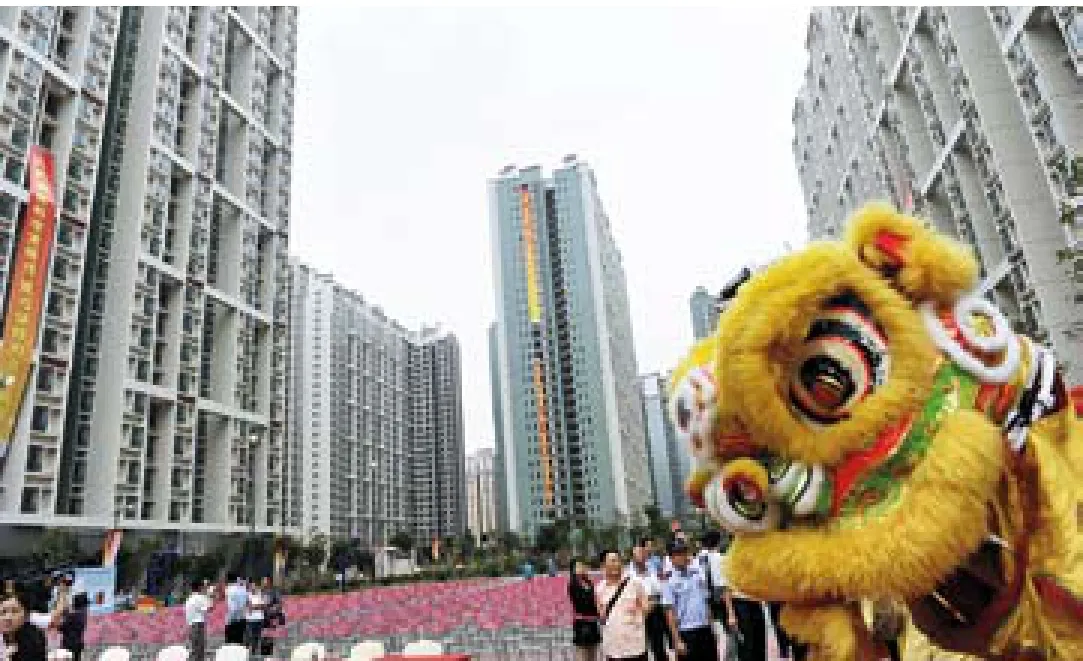
AFFORDABLE HOUSING: In October, 85,000 affordable houses were completed ahead of time in Guangzhou, south China’s Guangdong Province
According to China’s financial budget system, next year’s budget allocation is based on this year’s expenses, which means, if you can’t spend all of the budget this year, you might receive a lower budget allocation next year. Thus, how to spend the remaining funds of the current budget at the end of the year becomes a“big task” for many government departments.
Due to this “negative encouragement,”more and more government departments become extravagant. Therefore, only by replacing this negative process with a positive tool can we see more frugal government agencies.
The practice of Xi’an, capital of northwest China’s Shaanxi Province, may serve as a good solution. The government sets up a purchase platform on its website, two or more suppliers that intend to bid for the program then compete in terms of the price. Then relevant experts come to check the suppliers’goods. If the goods are ok, the department will sign a contract with the supplier, but the payment is not offered by the office itself, but by the local financial bureau. In that case, purchase prices will drop.
Guangzhou Daily
Affordable Housing
In March the State Council of China announced an ambitious national drive to build affordable housing for low- and middle-income groups. This year will see the beginning of construction on 10 million new units. However, it has been recently reported that one third of the affordable housing projects being constructed are still at the stage of digging pits.
In response to reports questioning the progress of this campaign, officials from the Ministry of Housing and Urban-Rural Development told the media that “beginning of construction” means that the buildings should at least have their foundations being built while projects whose pits are being dug or temporary enclosures being built should not be counted.
Understandably, we cannot demand that all of the 10 million new apartments be completed by the end of this year. However, instead of constantly monitoring whether the projects, foundations or walls have been built, the ministry should give a clear completion deadline for all the affordable housing projects. The ministry should also promulgate regulations on the punishments for the officials in areas that fail to finish their targets of affordable housing construction by the deadline. Only these measures can motivate local officials to effectively solve housing difficulties for disadvantaged groups by better managing their time and budget.
Dazhong Daily
SOCIETY
Poverty Reduction
China has effectively solved the problems of subsistence, food and clothing for its rural residents, says a white paper released by the Chinese Government on November 16.
According to the white paper, titled New Progress in the Development-Oriented Poverty Reduction Program for Rural China, China’s poverty-stricken rural population fell from 94.22 million at the end of 2000 to 26.88 million at the end of 2010.
The proportion of extremely poor people in the country’s rural population decreased from 10.2 percent to 2.8 percent over the same period.
The white paper says China has realized, ahead of schedule, the goal of cutting its impoverished rural population by half, which was listed in the UN Millennium Development Goals, thus making a great contribution to the world’s poverty reduction efforts.
Talent Search
China has launched 12 major programs in order to recruit skilled professionals, academics and experts, in various fields from home and abroad, to meet the nation’s huge demand for outstanding personnel.
These programs are part of the government’s blueprint to create a highly skilled national workforce by 2020.
Among the programs, the 1,000 Plan or the Recruitment Program of Global Experts, is a special plan targeted at recruiting “innovative” talent from overseas, particularly from Chinese studying abroad.
As of August, 1,510 top-level scientists and professionals had been recruited to work in China under the 1,000 Plan, according to statistics.
Those who choose to join the scheme are eligible for awards of up to 500,000 yuan ($78,743) in cash. Scientific research funds of between 1 million yuan ($157,490) and 3 million yuan ($472,470) are also available to researchers who participate in the program.
Narcotics Fight
China will work with its Asian neighbors under a cross-border initiative to curb the trafficking of precursor chemicals to Afghanistan for use in making heroin, said China’s Ministry of Public Security on November 15.
Operation TARCET, or Targeted anti-Trafficking Regional Communication, Expertise and Training, was launched by the United Nations Office on Drugs and Crime and the International Narcotics Control Board in 2007, focusing on the smuggling of acetic anhydride, a chemical compound used in the synthesis of heroin.
Several Asian countries, including Afghanistan, Kyrgyzstan, Tajikistan, Turkmenistan, Uzbekistan and Pakistan, are participating in the program. China joined in 2009.
Chinese police will share intelligence with police in participating countries, provide training for police officers and increase border controls under the operation, the ministry said.
Heating Up
A national scientific report estimates that sea levels around China will rise by 80 mm to 130 mm over the coming two decades, due to global warming.
The Second National Assessment Report on Climate Change, a joint work by the Ministry of Science and Technology, the China Meteorological Administration and the Chinese Academy of Sciences, also says the average temperature of the land surface in China had increased 1.38 degrees centigrade between 1951 to 2009.
China’s glaciers have shrunk by 10 percent over the past 60 years as a result of rising temperatures, according to the report.
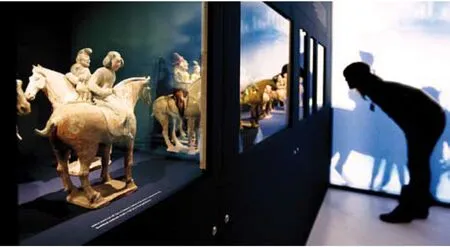
ADMIRING ANCIENT CHINA A visitor appreciates exhibits at an art exhibition of China’s Tang Dynasty (618-907) artifacts in the Drents Museum in Assen, northern Netherlands, on November 15
ECONOMY
Financial Assessment
China Financial Sector Assessment Program reports published by the IMF and the World Bank on November 15 applauded the progress China has made in its transition toward a more commercially oriented and financially sound system.
But the reports also warned that the country faces a steady build-up in vulnerabilities and listed interest and exchange rate reforms as top priorities.
The People’s Bank of China, the central bank, said that the reports are generally objective, positive and affirmative and that suggestions are constructive. However, certain views in the report are not sufficiently comprehensive or objective.
The central bank said specific timing and sequence of several proposed reforms should be based on further research of the country’s actual conditions.
China has made great progress in interest- and exchange-rate reforms, and market mechanisms have played a fundamental role in the formation of China’s interest and exchange rates, the central bank said, adding that the country will remain flexible in promoting reforms based on the country’s conditions.
New Gas Artery
China’s third west-to-east gas pipeline is expected to become operational by the end of 2013 and will carry about 30 billion cubic meters of gas annually,China Dailyreported.
The 5,200-km project will include one artery, six branch lines, three gas storage facilities and a liquefied natural gas terminal, and the pipeline will run from the Xinjiang Uygur Autonomous Region to Fuzhou, capital of southeast China’s Fujian Province.
The project is operated by PetroChina Co. Ltd., the listed arm of the country’s biggest energy conglomerate, China National Petroleum Corp.
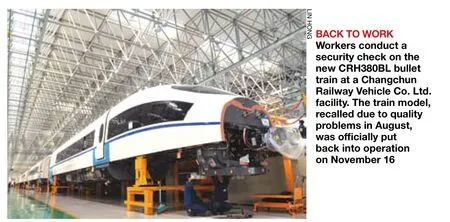
CCB Unaffected
Bank of America said on November 14 that it would sell most of its remaining shares, or about 10.4 billion H-shares, in China Construction Bank (CCB) to bolster its capital base.
“The selling by the Bank of America is a pure market act for its own reasons, and it is not going to affect the development of our operations,” said a CCB spokesman.
Bank of America has cut its stake in CCB several times since 2009. After the latest sale, the bank will own about 1 percent of CCB’s common shares.
Derailed Investment
China’s railway investment in the first 10 months of this year fell sharply, as the Ministry of Railways (MOR) is facing mounting pressure to pay off creditors.
The MOR announced on November 15 that its fixed-asset investments and infrastructure investments reached 429 billion yuan ($67.56 billion) and 367 billion yuan ($57.8 billion) in the first 10 months of this year, representing a sharp decrease of 25.2 percent and 28 percent from a year ago.
Previous data show that the MOR’s outstanding debt totaled 2.23 trillion yuan ($351.18 billion) as of the end of September, creating significant pressure for the ministry, as debt payments peaked in the fourth quarter.
Financing Small Firms
The China Banking Regulatory Commission has given the green light to three banks to auction special bonds worth 110 billion yuan ($17.32 billion) to finance loans to micro and small enterprises, in its latest efforts to lend support to struggling businesses.
China Minsheng Bank, Industrial Bank and Shanghai Pudong Development Bank were permitted to issue bonds of up to 50 billion yuan ($7.73 billion), 30 billion yuan ($4.72 billion) and 30 billion yuan, respectively, to channel loans to enterprises borrowing less than 5 million yuan ($787,402).
The loans under the policy will be excluded from the banks’ loan-to-deposit ratio calculation.
The move is subject to approval from the People’s Bank of China.

1. MALDIVES
Indian Prime Minister Manmohan Singh speaks with Pakistani Prime Minister Yousuf Raza Gilani on the sidelines of the 17th South Asian Association for Regional Cooperation Summit in Addu City on November 10
2. FRANCE
French veterans attend a ceremony at the Arc de Triomphe in Paris on November 11 as part of the Armistice Day celebrations marking the 93rd anniversary of the end of World War I
3. BRAZIL
A Brazilian Navy assault vehicle in the Rocinha Favela in Rio de Janeiro on November 13. Police forces launched a major operation to drive criminals from the city’s shantytowns
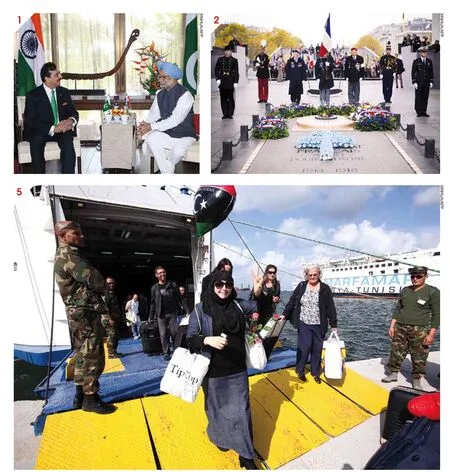
4. JAPAN
Japanese auto giant Nissan displays a Pivo 3 concept model at its headquarters in Yokohama for the first time to the public on November 12. The smart urban commuter car can park automatically in specially equipped parking lots
5. LIBYA
Passengers disembark from the first tourist ship to dock in Tripoli since the ouster of Muammar Gaddafi on November 10, following the resumption of maritime traffic between the Mediterranean island nation of Malta and the Libyan capital
6. THE UNITED STATES
Demonstrators rally outside Zuccotti Park in New York City on November 15 after police removed the “Occupy Wall Street” protesters who had camped in the park for nearly two months

